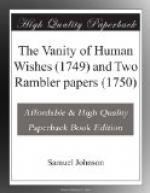A Man that has formed this Habit of turning every new Object to his Entertainment, finds in the Productions of Nature an inexhaustible Stock of Materials, upon which he can employ himself, without any Temptations to Envy or Malevolence; Faults, perhaps, seldom totally avoided by those, whose Judgment is much exercised upon the Works of Art. He has always a certain Prospect of discovering new Reasons for adoring the Sovereign Author of the Universe, and probable Hopes of making some Discovery of Benefit to others, or of Profit to himself. There is no doubt but many Vegetables and Animals have Qualities that might be of great Use; to the Knowledge of which there is required no great Sagacity of Penetration, or Fatigue of Study, but only frequent Experiments, and close Attention. What is said by the Chymists of their darling Mercury, is, perhaps, true of every Body through the whole Creation, that, if a thousand Lives should be spent upon it, all its Properties would not be found out.
Mankind must necessarily be diversified by various Tastes, since Life affords and requires such multiplicity of Employments; and a Nation of Naturalists is neither to be hoped, or desired, but it is surely not improper to point out a fresh Amusement to those who langush in Health, and repine in Plenty, for want of some Source of Diversion that may be less easily exhausted, and to inform the Multitudes of both Sexes, who are burthened with every new Day, that there are many Shews which they have not seen.
He that enlarges his Curiosity after the Works of Nature, demonstrably multiplies the Inlets to Happiness, and, therefore, the younger Part of my Readers, to whom I dedicate this vernal Speculation, must excuse me for calling upon them to make use at once of the Spring of the Year, and the Spring of Life; to acquire, while their Minds may be yet impressed with new Images, a Love of innocent Pleasures, and an ardour for useful Knowledge; and to remember, that a blighted Spring makes a barren Year, and that the vernal Flowers, however beautiful and gay, are only intended by Nature as Preparatives to Autumnal Fruits.
LONDON: Printed for J. PAYNE, and J. BOUQUET, in Pater-noster-Row; where Letters for the RAMBLER are received, and the preceding Numbers may be had.
THE RAMBLER.
NUMB. 60. Price 2 d.
To be continued on TUESDAYS and SATURDAYS.
SATURDAY, October 13, 1750.
—Quid fit pulchrum, quid
turpe, quid utile, quid non,
Plenius et melius Chrysippo et
Crantore dicit. HOR.
All Joy or Sorrow for the Happiness or Calamities of others is produced by an Act of the Imagination, that realises the Event however fictitious, or approximates it however remote, by placing us, for a Time, in the Condition of him whose Fortune we contemplate; so that we feel, while the Deception lasts, whatever Motions would be excited by the same Good or Evil happening to ourselves.




